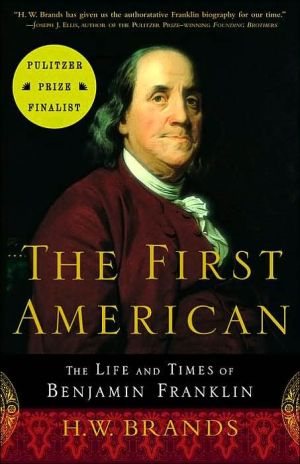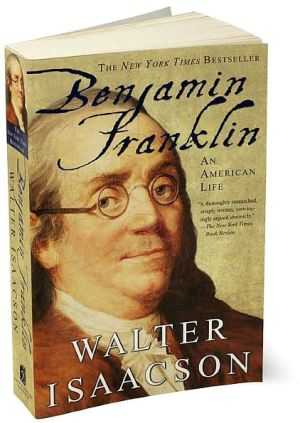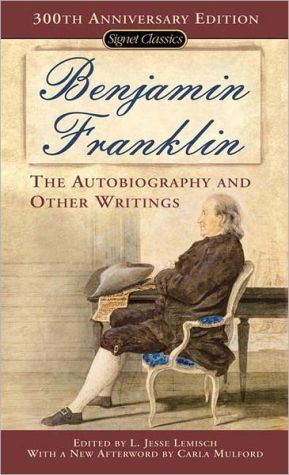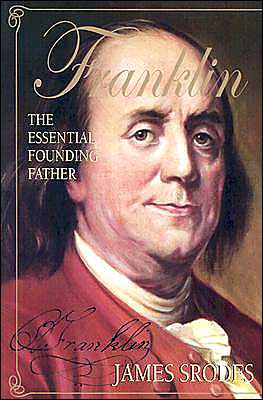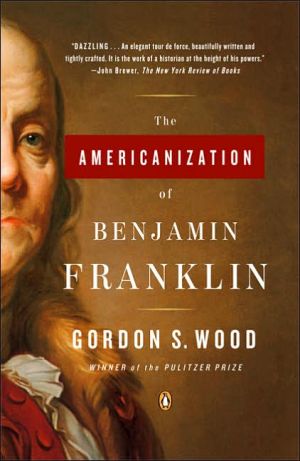The First American: The Life and Times of Benjamin Franklin
National Bestseller \ He was the foremost American of his day, yet today he is little more than a mythic caricature in the public imagination. Benjamin Franklin, perhaps the pivotal figure in colonial and revolutionary America, comes vividly to life in this masterly biography.\ Wit, diplomat, scientist, philosopher, businessman, inventor, and bon vivant, Benjamin Franklin was in every respect America’s first Renaissance man. From penniless runaway to highly successful printer, from...
Search in google:
National Bestseller He was the foremost American of his day, yet today he is little more than a mythic caricature in the public imagination. Benjamin Franklin, perhaps the pivotal figure in colonial and revolutionary America, comes vividly to life in this masterly biography.Wit, diplomat, scientist, philosopher, businessman, inventor, and bon vivant, Benjamin Franklin was in every respect America’s first Renaissance man. From penniless runaway to highly successful printer, from ardently loyal subject of Britain to architect of an alliance with France that ensured America’s independence, Franklin went from obscurity to become one of the world’s most admired figures, whose circle included the likes of Voltaire, Hume, Burke, and Kant. Drawing on previously unpublished letters and a host of other sources, acclaimed historian H. W. Brands has written a thoroughly engaging biography of the eighteenth-century genius. A much needed reminder of Franklin’s greatness and humanity, The First American is a work of meticulous scholarship that provides a magnificent tour of a legendary historical figure, a vital era in American life, and the countless arenas in which the protean Franklin left his legacy.Washington Post Book WorldOne of the more interesting rags-to-riches lives in the history of humanity.
A lesser man would have been humiliated.\ Humiliation was the purpose of the proceeding.\ It was the outcome eagerly anticipated by the lords of the Privy Council who constituted the official audience, by the members of the House of Commons and other fashionable Londoners who packed the room and hung on the rails of the balcony, by the London press that lived on scandal and milled outside to see how this scandal would unfold, by the throngs that bought the papers, savored the scandals, rioted in favor of their heroes and against their villains, and made politics in the British imperial capital often unpredictable, frequently disreputable, always entertaining. The proceeding today would probably be disreputable. It would certainly be entertaining.\ The venue was fitting: the Cockpit. In the reign of Henry VIII, that most sporting of monarchs in a land that loved its bloody games, the building on this site had housed an actual cockpit, where Henry and his friends brought their prize birds and wagered which would tear the others to shreds. The present building had replaced the real cockpit, but this room retained the old name and atmosphere. The victim today was expected to depart with his reputation in tatters, his fortune possibly forfeit, his life conceivably at peril.\ Nor was that the extent of the stakes. Two days earlier the December packet ship from Boston had arrived with an alarming report from the royal governor of Massachusetts, Thomas Hutchinson. The governor described an organized assault on three British vessels carrying tea of the East India Company. The assailants, townsmen loosely disguised as Indians, had boarded the ships, hauled hundreds of tea casks to deck, smashed them open, and dumped their contents into the harbor forty-five tons of tea, enough to litter the beaches for miles and depress the company's profits for years. This rampage was the latest in a series of violent outbursts against the authority of Crown and Parliament; the audience in the Cockpit, and in London beyond, demanded to know what Crown and Parliament intended to do about it.\ Alexander Wedderburn was going to tell them. The solicitor general possessed great rhetorical gifts and greater ambition. The former had made him the most feared advocate in the realm; the latter lifted him to his present post when he abandoned his allies in the opposition and embraced the ministry of Lord North. Wedderburn was known to consider the Boston tea riot treason, and if the law courts upheld his interpretagtion, those behind the riot would be liable to the most severe sanctions, potentially including death. Wedderburn was expected to argue that the man in the Cockpit today was the prime mover behind the outburst in Boston. The crowd quivered with anticipation.\ They all knew the man in the pit; indeed, the whole world knew Benjamin Franklin. His work as political agent for several of the American colonies had earned him recognition around London, but his fame far transcended that. He was, quite simply, one of the most illustrious scientists and thinkers on earth. His experiments with electricity, culminating in his capture of lightning from the heavens, had won him universal praise as the modern Prometheus. His mapping of the Gulf Stream saved the time and lives of countless sailors. His ingenious fireplace conserved fuel and warmed homes on both sides of the Atlantic. His contributions to economics, meteorology, music, and psychology expanded the reach of human knowledge and the grip of human power. For his accomplishments the British Royal Society had awarded him its highest prize; foreign societies had done the same. Universities queued to grant him degrees. The ablest minds of the age consulted him on matters large and small. Kings and emperors summoned him to court, where they admired his brilliance and basked in its reflected glory.\ Genius is prone to producing envy. Yet it was part of Franklin's genius that he had produced far less than his share, due to an unusual ability to disarm those disposed to envy. In youth he discovered that he was quicker of mind and more facile of pen than almost everyone he met; he also discovered that a boy of humble birth, no matter how gifted, would block his own way by letting on that he knew how smart he was. He learned to deflect credit for some of his most important innovations. He avoided arguments wherever possible; when important public issues hinged on others' being convinced of their errors, he often argued anonymously, adopting assumed names, or Socratically, employing the gentle questioning of the Greek master. He became almost as famous for his sense of humor as for his science; laughing, his opponents listened and were persuaded.\ Franklin's self-effacing style succeeded remarkably; at sixty-eight he had almost no personal enemies and comparatively few political enemies for a man of public affairs. But those few included powerful figures. George Grenville, the prime minister responsible for the Stamp Act, the tax bill that triggered all the American troubles, never forgave him for single-handedly demolishing the rationale for the act in a memorable session before the House of Commons.\ Grenville and his allies lay in wait to exact their revenge on Franklin. Yet he never made a false step. Until now. A mysterious person had delivered into his hands confidential letters from Governor Hutchinson and other royal officials in Massachusetts addressed to an undersecretary of state in London. These letters cast grave doubt on the bona fides of Hutchinson, for years the bête noire of the Massachusetts assembly. As Massachusetts's agent, Franklin had forwarded the letters to friends in Boston. Hutchinson's enemies there got hold of the letters and published them.\ The publication provoked an instant uproar. In America the letters were interpreted as part of a British plot to enslave the colonies; the letters fueled the anger that inspired the violence that produced the Boston tea riot. In England the letters provoked charges and countercharges as to who could have been so dishonorable as to steal and publish private correspondence. A duel at swords left one party wounded and bothparties aching for further satisfaction; only at this point—to prevent more bloodshed—did Franklin reveal his role in transmitting the letters.\ His foes seized the chance to destroy him. Since that session in Commons eight years before, he had become the symbol and spokesman in London of American resistance to the sovereignty of Parliament; on his head would be visited all the wrath and resentment that had been building in that proud institution from the time of the Stamp Act to the tea riot. Alexander Wedderburn sharpened his tongue and moved in for the kill.\ None present at the Cockpit on January 29, 1774, could afterward recall the like of the hearing that day. The solicitor general outdid himself. For an hour he hurled invective at Franklin, branding him a liar, a thief, the instigator of the insurrection in Massachusetts, an outcast from the company of all honest men, an ingrate whose attack on Hutchinson betrayed nothing less than a desire to seize the governor's office for himself. So slanderous was Wedderburn's diatribe that no London paper would print it. But the audience reveled in it, hooting and applauding each sally, each bilious bon mot. Not even the lords of the Privy Council attempted to disguise their delight at Wedderburn's astonishing attack. Almost to a man and a woman, the spectators that day concluded that Franklin's reputation would never recover. Ignominy, if not prison or worse, was his future now.
Prologue: January 29, 177411.Boston Beginnings: 1706-2392.Friends and Other Strangers: 1723-24353.London Once: 1724-26604.An Imprint of His Own: 1726-30825.Poor Richard: 1730-351066.Citizen: 1735-401327.Arc of Empire: 1741-481578.Electricity and Fame: 1748-511879.A Taste of Politics: 1751-5420710.Join or Die: 1754-5522811.The People's Colonel: 1755-5725212.A Larger Stage: 1757-5827213.Imperialist: 1759-6029014.Briton: 1760-6230815.Rising in the West: 1762-6433116.Stamps and Statesmanship: 1764-6635917.Duties and Pleasures: 1766-6737818.Reason and Riot: 1768-6939819.The Rift Widens: 1770-7142220.To Kick a Little: 1772-7344421.The Cockpit: 1774-7546422.Rebel: 1775-7649123.Salvation in Paris: 1776-7852024.Bonhomme Richard: 1778-7954525.Minister Plenipotentiary: 1779-8157126.Blessed Work: 1781-8259727.Savant: 1783-8562128.Home: 1785-8664329.Sunrise at Dusk: 1786-8766630.To Sleep: 1787-90692Epilogue: April 17, 1990712Source Notes717Acknowledgments743Index745
\ From Barnes & NobleJust as he suggested the humble turkey as our national bird in lieu of the bald eagle, so it might be argued that, celebrated as he is, Benjamin Franklin's contributions to the forging of the young United States have gone underappreciated. His Zelig-like knack for being in and among the influential figures of the day, his lightning wit, his business acumen, his literary and journalistic accomplishments, his inventions, his skills at negotiation -- these qualities that so set Franklin apart in his day inspire a sort of astonished admiration today. Brands's engaging and insightful look at this latter-day Renaissance man is a welcome and overdue tribute.\ \ \ \ \ From the Publisher“H.W Brands has given us the authoritative Franklin biography for out time.” —Joseph J. Ellis author of the Pulitzer Prize-winning Founding Brothers\ \ “Like its subject, this biography is both solid and enchanting.” —The New Yorker\ “[A] biography with a rich cast of secondary characters and a large and handsome stock of historical scenery.... Brands writes clearly and confidently about the full spectrum of the polymath’s interests.... This is a Franklin to savor.” —The Wall Street Journal\ “Benjamin Franklin’s life is one every American should know well, and it has not been told better than by Mr. Brands.” —The Dallas Morning News\ \ “A vivid portrait of the 18th-century milieu and of the 18th-century man.... [Brands is] a master storyteller.” —The Christian Science Monitor\ “A thorough biography of Benjamin Franklin, America’s first Renaissance man.... In graceful, even witty prose.... Brands relates the entire, dense-packed life.” —The Washington Post\ \ “A lively re-introduction to Franklin.... Rich in the descriptions of settings, personalities, and action.... [Brands] offers ... a succession of amusing anecdotes and vivid tales.” —The New Republic\ “Comprehensive, lively.... [Brands] is a skilled narrator who believes in making good history accessible to the non-specializing book lover, and the general reader can read this book with sustained enjoyment.” —The Boston Globe\ \ \ \ \ Washington Post Book WorldOne of the more interesting rags-to-riches lives in the history of humanity.\ \ \ \ \ From The CriticsHistorian Brands illuminates Franklin's many facets in this informative biography. One can quibble with Brands' hyperbolic title (the term "first American" could apply to a dozen other figures), but not with Franklin's contribution to American history. Born into a colonial America still ruled by Great Britain and dominated by religious ideologues, he helped transform the loosely affiliated colonies into a united, freedom-loving opposition to the crown and later into a full-fledged nation. In retelling Franklin's life, Brands writes in a clear, lively, novelistic style and is especially good at revealing Franklin, the living, breathing, flawed human being. But when reporting on a life as rich as Franklin's, it's hard not to leave out as much interesting detail as one leaves in. Gossip lovers will no doubt be dismayed at how little space is devoted to the juicier moments in Franklin's life, such as his foolish middle-age dalliance with the twenty-three-year-old Katy Ray. Even at 759 pages, this book still ends too quickly.\ —Jack Helbig \ \ \ \ \ \ \ Publishers Weekly"Franklin's story is the story of a man--an exceedingly gifted man and a most engaging one. It is also the story of the birth of America--an America this man discovered in himself, then helped create in the world at large," says Texas A&M historian Brands (T.R.: The Last Romantic, etc.) in the prologue to his stunning new work. Franklin's father took him out of school at age 11, but the boy assiduously sacrificed sleep (while working as an apprentice printer) to read and learn, giving himself rigorous exercises to develop his ease with language and discourse, among other disciplines. In essence, as Brands vividly demonstrates, Franklin defined the Renaissance man. He made multiple contributions to science (electricity, meteorology), invention (bifocal lenses, the Franklin furnace) and civic institutions (the American Philosophical Society, the University of Pennsylvania, the U.S. Post Office). But Brands is primarily concerned with Franklin's development as a thinker, politician and statesman and places his greatest emphasis there. In particular, Brands does an excellent job of capturing Franklin's exuberant versatility as a writer who adopted countless personae--evidence of his gift for seeing the world through a variety of different lenses--that not only predestined his prominence as a man of letters but also as an agile man of politics. From Franklin's progress as a self-declared "Briton"--serving as London agent for Pennsylvania, Massachusetts and other colonies--to his evolution as an American (wartime minister to France, senior peace negotiator with Britain and, finally, senior participant at the Constitutional Convention), Brands, with admirable insight and arresting narrative, constructs a portrait of a complex and influential man ("only Washington mattered as much") in a highly charged world. (Sept.) Copyright 2000 Cahners Business Information.\|\ \ \ \ \ Library JournalIn this new biography, Brands (history, Texas A&M Univ.; T.R.: The Last Romantic) sees Franklin's January 29, 1774 confrontation in Parliament with Alexander Wedderburn, first Earl of Rosslyn (1733-1805), as the formative moment in Benjamin Franklin's life. During those two hours in the "Cockpit," it was not just Wedderburn insulting Franklin, "it was also Britain mocking America." Franklin's story, as Brands sees and tells it, "is also the story of the birth of America--an America this man discovered in himself, then helped create in the world at large." Brands, a master storyteller himself, draws on letters to and by Franklin, as well as recollections of Franklin's contemporaries, to create an absorbing portrait of the 18th-century world that was the backdrop--and the stage--for America's multidimensional journalist, inventor, diplomat, propagandist, moralist, humorist, and revolutionary. Brands's eminently readable narrative is a worthy successor to Carl Van Doren's classic Pulitzer Prize-winning Benjamin Franklin. Recommended for public and academic libraries.--Robert C. Jones, Central Missouri State Univ., Warrensburg Copyright 2000 Cahners Business Information.\\\ \ \ \ \ BooknewsThis first biography of Benjamin Franklin in over 60 years brings to life one of the most delightful, bawdy, original, and important figures in American history. Draws on previously unpublished letters to and from Franklin, as well as recollections and anecdotes of Franklin's contemporaries, to create a portrait of the 18th-century genius who was America's first Renaissance man. Brands teaches history at Texas A&M University. Annotation c. Book News, Inc., Portland, OR (booknews.com)\ \ \ \ \ New YorkerLike it's subject, this biography is both solid and enchanting...Franklin emerges as a man with a passion to add to human happiness.\ \ \ \ \ Kirkus ReviewsA rousing, firstrate life of a Founding Father.\ \
